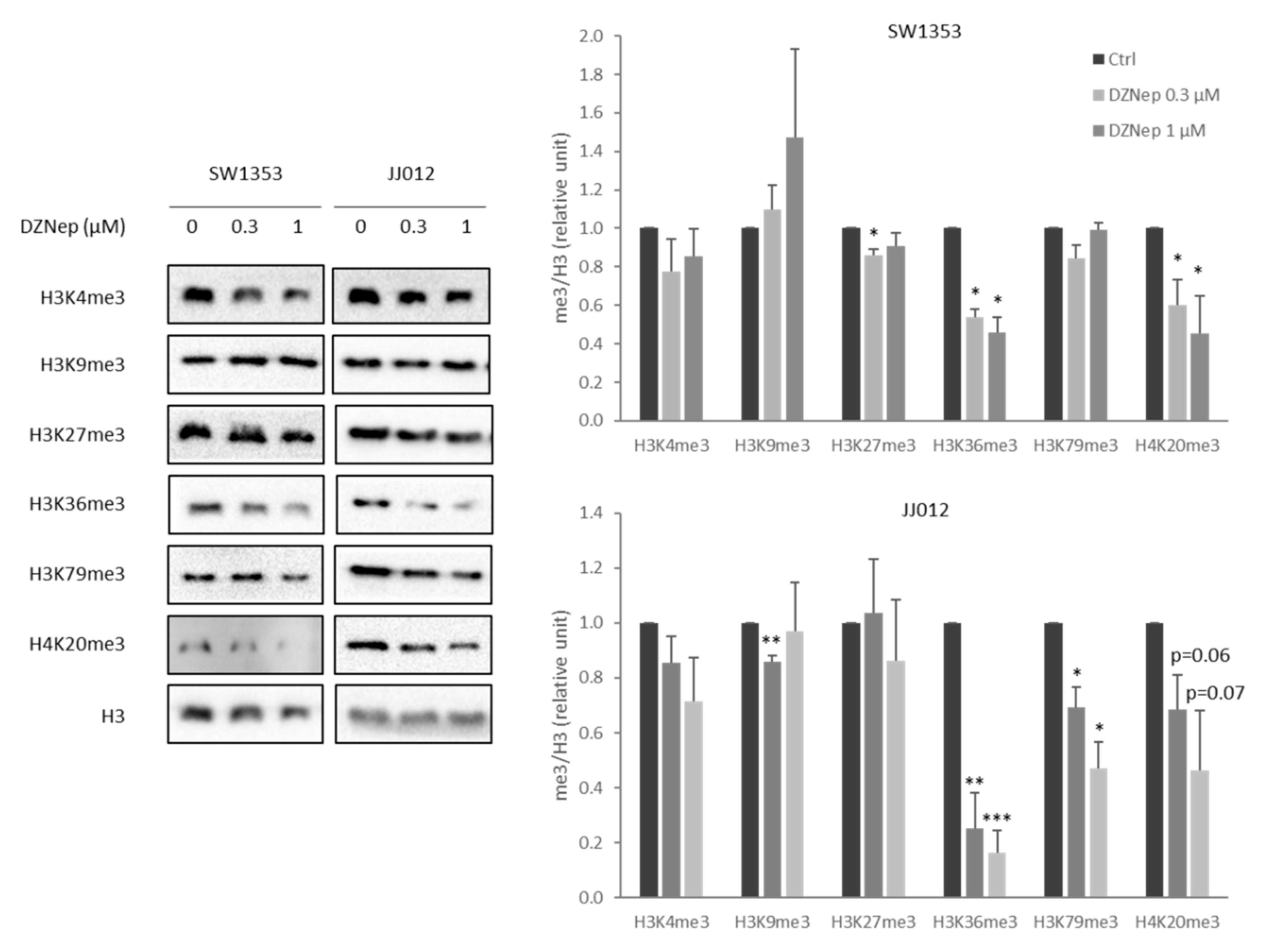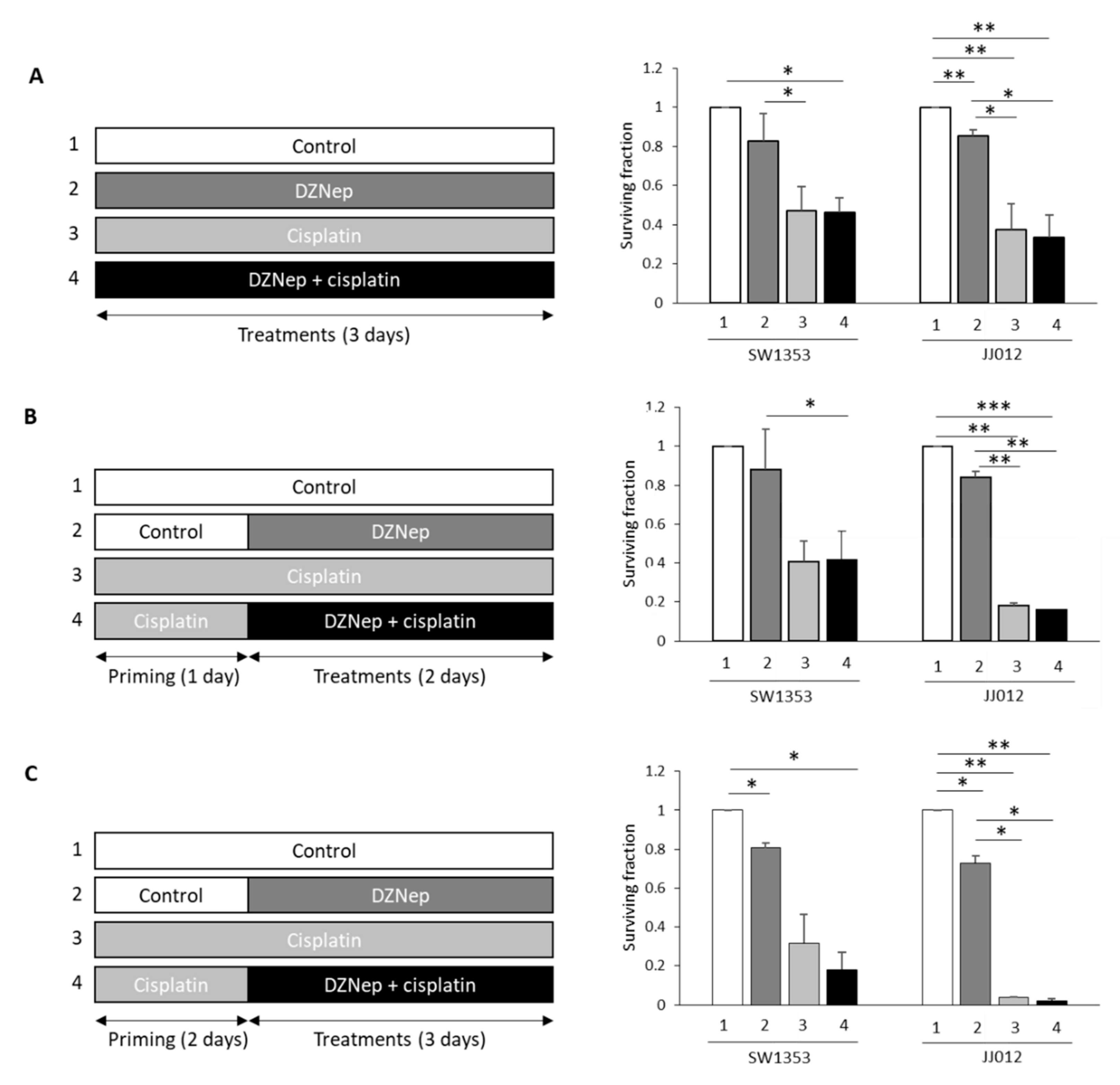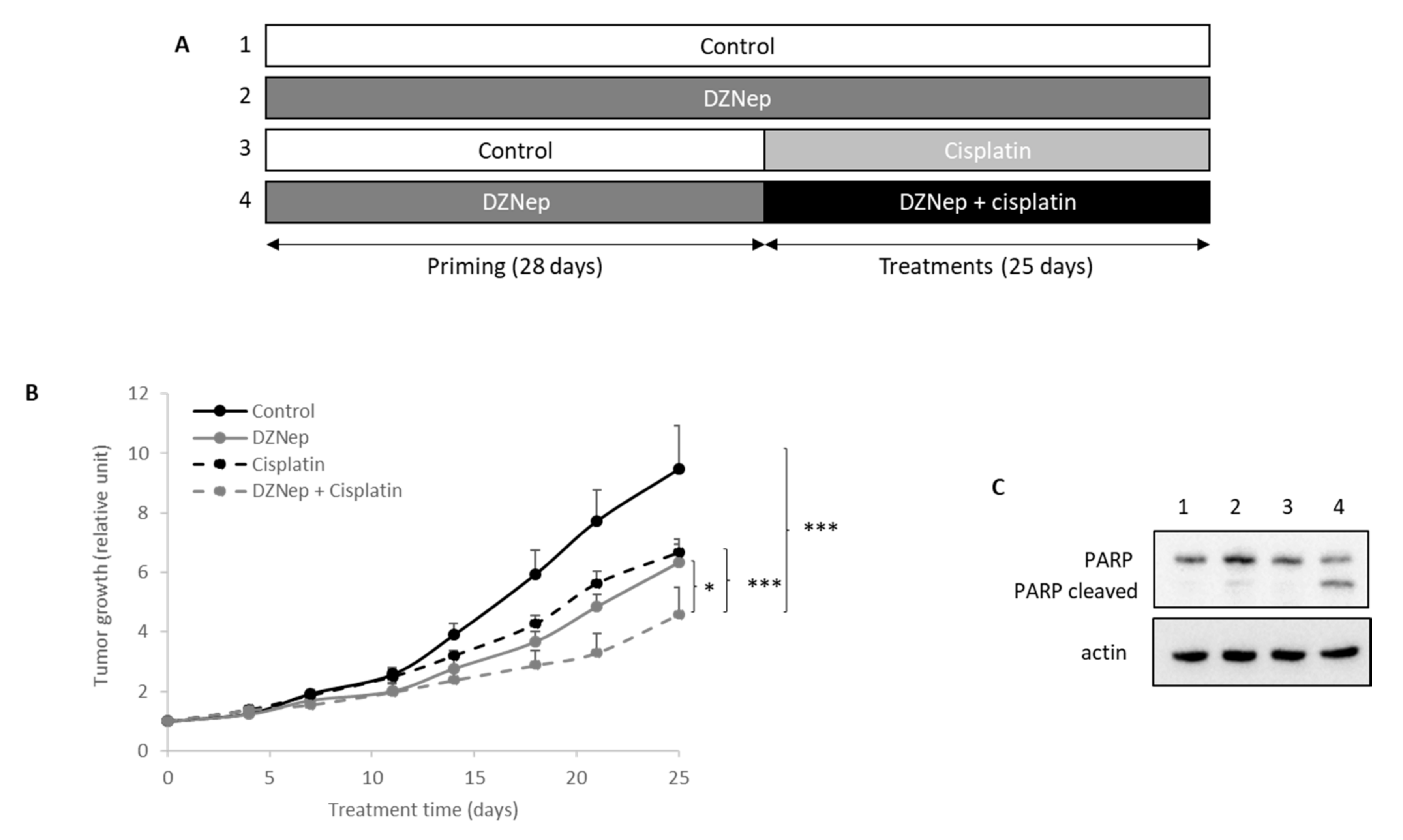Co-Treatment with the Epigenetic Drug, 3-Deazaneplanocin A (DZNep) and Cisplatin after DZNep Priming Enhances the Response to Platinum-Based Therapy in Chondrosarcomas
Abstract
:Simple Summary
Abstract
1. Introduction
2. Materials and Methods
2.1. Drugs
2.2. Cell Culture
2.3. Cell Growth Experiments
2.4. Apoptosis Assay
2.5. Animals
2.6. Xenograft of Chondrosarcomas in Nude Mice
2.7. Protein Extraction and Western Blot
2.8. Statistical Analysis
3. Results
3.1. DZNep Reduces Histone Methylation in Chondrosarcomas
3.2. Co-Treatment DZNep/Cisplatin Is Not Sufficient to Reduce Survival Compared to Cisplatin Treatment
3.3. Co-Treatment with DZNep and Cisplatin after DZNep Priming Enhances the Sensibility to Cisplatin in Chondrosarcomas
3.4. Co-Treatment with DZNep and Cisplatin after DZNep Priming Does Not Enhance Chondrocyte Sensibility to Cisplatin
3.5. Peritoneal Injection of DZNep and Cisplatin Reduces Tumor Growth in Xenograft Mice
4. Discussion
5. Conclusions
Supplementary Materials
Author Contributions
Funding
Institutional Review Board Statement
Informed Consent Statement
Data Availability Statement
Acknowledgments
Conflicts of Interest
References
- Giuffrida, A.Y.; Burgueno, J.E.; Koniaris, L.G.; Gutierrez, J.C.; Duncan, R.; Scully, S.P. Chondrosarcoma in the United States (1973 to 2003): An analysis of 2890 cases from the SEER database. J. Bone Jt. Surg. Am. 2009, 91, 1063–1072. [Google Scholar] [CrossRef]
- Leddy, L.R.; Holmes, R.E. Chondrosarcoma of bone. Cancer Treat. Res. 2014, 162, 117–130. [Google Scholar] [CrossRef]
- Lhuissier, E.; Bazille, C.; Aury-Landas, J.; Girard, N.; Pontin, J.; Boittin, M.; Boumediene, K.; Baugé, C. Identification of an easy to use 3D culture model to investigate invasion and anticancer drug response in chondrosarcomas. BMC Cancer 2017, 17, 490. [Google Scholar] [CrossRef] [PubMed]
- Girard, N.; Bazille, C.; Lhuissier, E.; Benateau, H.; Llombart-Bosch, A.; Boumediene, K.; Bauge, C. 3-Deazaneplanocin A (DZNep), an inhibitor of the histone methyltransferase EZH2, induces apoptosis and reduces cell migration in chondrosarcoma cells. PLoS ONE 2014, 9, e98176. [Google Scholar] [CrossRef] [PubMed] [Green Version]
- Aury-Landas, J.; Girard, N.; Lhuissier, E.; Adouane, D.; Delépée, R.; Boumediene, K.; Baugé, C. The Antitumoral Effect of the S-Adenosylhomocysteine Hydrolase Inhibitor, 3-Deazaneplanocin A, is Independent of EZH2 but is Correlated with EGFR Downregulation in Chondrosarcomas. Cell. Physiol. Biochem. 2019, 53, 731–745. [Google Scholar] [PubMed] [Green Version]
- Glazer, R.I.; Knode, M.C.; Tseng, C.K.; Haines, D.R.; Marquez, V.E. 3-Deazaneplanocin A: A new inhibitor of S-adenosylhomocysteine synthesis and its effects in human colon carcinoma cells. Biochem. Pharmacol. 1986, 35, 4523–4527. [Google Scholar] [CrossRef] [Green Version]
- Miranda, T.B.; Cortez, C.C.; Yoo, C.B.; Liang, G.; Abe, M.; Kelly, T.K.; Marquez, V.E.; Jones, P.A. DZNep is a global histone methylation inhibitor that reactivates developmental genes not silenced by DNA methylation. Mol. Cancer Ther. 2009, 8, 1579–1588. [Google Scholar] [CrossRef] [Green Version]
- Tan, J.; Yang, X.; Zhuang, L.; Jiang, X.; Chen, W.; Lee, P.L.; Karuturi, R.K.M.; Tan, P.B.O.; Liu, E.T.; Yu, Q. Pharmacologic disruption of Polycomb-repressive complex 2-mediated gene repression selectively induces apoptosis in cancer cells. Genes Dev. 2007, 21, 1050–1063. [Google Scholar] [CrossRef] [Green Version]
- Cheng, L.L.; Itahana, Y.; Lei, Z.D.; Chia, N.-Y.; Wu, Y.; Yu, Y.; Zhang, S.L.; Thike, A.A.; Pandey, A.; Rozen, S.; et al. TP53 Genomic Status Regulates Sensitivity of Gastric Cancer Cells to the Histone Methylation Inhibitor 3-Deazaneplanocin A (DZNep). Clin. Cancer Res. 2012, 18, 4201–4212. [Google Scholar] [CrossRef] [Green Version]
- Xie, Z.; Bi, C.; Cheong, L.L.; Liu, S.C.; Huang, G.; Zhou, J.; Yu, Q.; Chen, C.-S.; Chng, W.J. Determinants of Sensitivity to DZNep Induced Apoptosis in Multiple Myeloma Cells. PLoS ONE 2011, 6, e21583. [Google Scholar] [CrossRef] [Green Version]
- Ciarapica, R.; Carcarino, E.; Adesso, L.; De Salvo, M.; Bracaglia, G.; Leoncini, P.P.; Dall’agnese, A.; Verginelli, F.; Milano, G.M.; Boldrini, R.; et al. Pharmacological inhibition of EZH2 as a promising differentiation therapy in embryonal RMS. BMC Cancer 2014, 14, 139. [Google Scholar] [CrossRef] [PubMed] [Green Version]
- Li, Z.; Wang, Y.; Qiu, J.; Li, Q.; Yuan, C.; Zhang, W.; Wang, D.; Ye, J.; Jiang, H.; Yang, J.; et al. The polycomb group protein EZH2 is a novel therapeutic target in tongue cancer. Oncotarget 2013, 4, 2532–2549. [Google Scholar] [CrossRef] [Green Version]
- Crea, F.; Hurt, E.M.; Mathews, L.A.; Cabarcas, S.M.; Sun, L.; Marquez, V.E.; Danesi, R.; Farrar, W.L. Pharmacologic disruption of Polycomb Repressive Complex 2 inhibits tumorigenicity and tumor progression in prostate cancer. Mol. Cancer 2011, 10, 40. [Google Scholar] [CrossRef] [Green Version]
- Liu, L.; Xu, Z.; Zhong, L.; Wang, H.; Jiang, S.; Long, Q.; Xu, J.; Guo, J. Enhancer of zeste homolog 2 (EZH2) promotes tumour cell migration and invasion via epigenetic repression of E-cadherin in renal cell carcinoma. BJU Int. 2016, 117, 351–362. [Google Scholar] [CrossRef]
- Tellez, C.S.; Picchi, M.A.; Juri, D.; Do, K.; Desai, D.H.; Amin, S.G.; Hutt, J.A.; Filipczak, P.T.; Belinsky, S.A. Chromatin remodeling by the histone methyltransferase EZH2 drives lung pre-malignancy and is a target for cancer prevention. Clin. Epigenetics 2021, 13, 44. [Google Scholar] [CrossRef]
- Lhuissier, E.; Aury-Landas, J.; Bouet, V.; Bazille, C.; Repesse, Y.; Freret, T.; Boumédiene, K.; Baugé, C.; Lhuissier, E.; Aury-Landas, J.; et al. Evaluation of the impact of S-adenosylmethionine-dependent methyltransferase inhibitor, 3-deazaneplanocin A, on tissue injury and cognitive function in mice. Oncotarget 2018, 9, 20698–20708. [Google Scholar] [CrossRef] [Green Version]
- Bray, M.; Driscoll, J.; Huggins, J.W. Treatment of lethal Ebola virus infection in mice with a single dose of an S-adenosyl-L-homocysteine hydrolase inhibitor. Antiviral Res. 2000, 45, 135–147. [Google Scholar] [CrossRef]
- Hung, S.W.; Mody, H.; Marrache, S.; Bhutia, Y.D.; Davis, F.; Cho, J.H.; Zastre, J.; Dhar, S.; Chu, C.K.; Govindarajan, R. Pharmacological Reversal of Histone Methylation Presensitizes Pancreatic Cancer Cells to Nucleoside Drugs: In Vitro Optimization and Novel Nanoparticle Delivery Studies. PLoS ONE 2013, 8, e71196. [Google Scholar] [CrossRef] [PubMed] [Green Version]
- Ni, J.; Hou, X.; Wang, X.; Shi, Y.; Xu, L.; Zheng, X.; Liu, N.; Qiu, A.; Zhuang, S. 3-deazaneplanocin A protects against cisplatin-induced renal tubular cell apoptosis and acute kidney injury by restoration of E-cadherin expression. Cell Death Dis. 2019, 10, 355. [Google Scholar] [CrossRef] [Green Version]
- Guo, L.; Lee, Y.-T.; Zhou, Y.; Huang, Y. Targeting epigenetic regulatory machinery to overcome cancer therapy resistance. Semin. Cancer Biol. 2021. [Google Scholar] [CrossRef] [PubMed]
- Jagasia, A.A.; Block, J.A.; Diaz, M.O.; Nobori, T.; Gitelis, S.; Inerot, S.E.; Iyer, A.P. Partial deletions of the CDKN2 and MTS2 putative tumor suppressor genes in a myxoid chondrosarcoma. Cancer Lett. 1996, 105, 77–90. [Google Scholar] [CrossRef]
- Scully, S.P.; Berend, K.R.; Toth, A.; Qi, W.N.; Qi, Z.; Block, J.A. Marshall Urist Award. Interstitial collagenase gene expression correlates with in vitro invasion in human chondrosarcoma. Clin. Orthop. 2000, 291–303. [Google Scholar] [CrossRef] [PubMed]
- Duval, E.; Bigot, N.; Hervieu, M.; Kou, I.; Leclercq, S.; Galéra, P.; Boumediene, K.; Baugé, C. Asporin Expression Is Highly Regulated in Human Chondrocytes. Mol. Med. 2011, 17, 816–823. [Google Scholar] [CrossRef]
- Avan, A.; Crea, F.; Paolicchi, E.; Funel, N.; Galvani, E.; Marquez, V.E.; Honeywell, R.J.; Danesi, R.; Peters, G.J.; Giovannetti, E. Molecular mechanisms involved in the synergistic interaction of the EZH2 inhibitor 3-deazaneplanocin A with gemcitabine in pancreatic cancer cells. Mol. Cancer Ther. 2012, 11, 1735–1746. [Google Scholar] [CrossRef] [PubMed] [Green Version]
- Nakagawa, S.; Sakamoto, Y.; Okabe, H.; Hayashi, H.; Hashimoto, D.; Yokoyama, N.; Tokunaga, R.; Sakamoto, K.; Kuroki, H.; Mima, K.; et al. Epigenetic therapy with the histone methyltransferase EZH2 inhibitor 3-deazaneplanocin A inhibits the growth of cholangiocarcinoma cells. Oncol. Rep. 2014, 31, 983–988. [Google Scholar] [CrossRef] [PubMed] [Green Version]
- Unland, R.; Borchardt, C.; Clemens, D.; Kool, M.; Dirksen, U.; Frühwald, M.C. Analysis of the antiproliferative effects of 3-deazaneoplanocin A in combination with standard anticancer agents in rhabdoid tumor cell lines. Anticancer Drugs 2015, 26, 301–311. [Google Scholar] [CrossRef]




Publisher’s Note: MDPI stays neutral with regard to jurisdictional claims in published maps and institutional affiliations. |
© 2021 by the authors. Licensee MDPI, Basel, Switzerland. This article is an open access article distributed under the terms and conditions of the Creative Commons Attribution (CC BY) license (https://creativecommons.org/licenses/by/4.0/).
Share and Cite
Lhuissier, E.; Aury-Landas, J.; Lenté, M.; Boumediene, K.; Baugé, C. Co-Treatment with the Epigenetic Drug, 3-Deazaneplanocin A (DZNep) and Cisplatin after DZNep Priming Enhances the Response to Platinum-Based Therapy in Chondrosarcomas. Cancers 2021, 13, 4648. https://doi.org/10.3390/cancers13184648
Lhuissier E, Aury-Landas J, Lenté M, Boumediene K, Baugé C. Co-Treatment with the Epigenetic Drug, 3-Deazaneplanocin A (DZNep) and Cisplatin after DZNep Priming Enhances the Response to Platinum-Based Therapy in Chondrosarcomas. Cancers. 2021; 13(18):4648. https://doi.org/10.3390/cancers13184648
Chicago/Turabian StyleLhuissier, Eva, Juliette Aury-Landas, Marion Lenté, Karim Boumediene, and Catherine Baugé. 2021. "Co-Treatment with the Epigenetic Drug, 3-Deazaneplanocin A (DZNep) and Cisplatin after DZNep Priming Enhances the Response to Platinum-Based Therapy in Chondrosarcomas" Cancers 13, no. 18: 4648. https://doi.org/10.3390/cancers13184648
APA StyleLhuissier, E., Aury-Landas, J., Lenté, M., Boumediene, K., & Baugé, C. (2021). Co-Treatment with the Epigenetic Drug, 3-Deazaneplanocin A (DZNep) and Cisplatin after DZNep Priming Enhances the Response to Platinum-Based Therapy in Chondrosarcomas. Cancers, 13(18), 4648. https://doi.org/10.3390/cancers13184648





